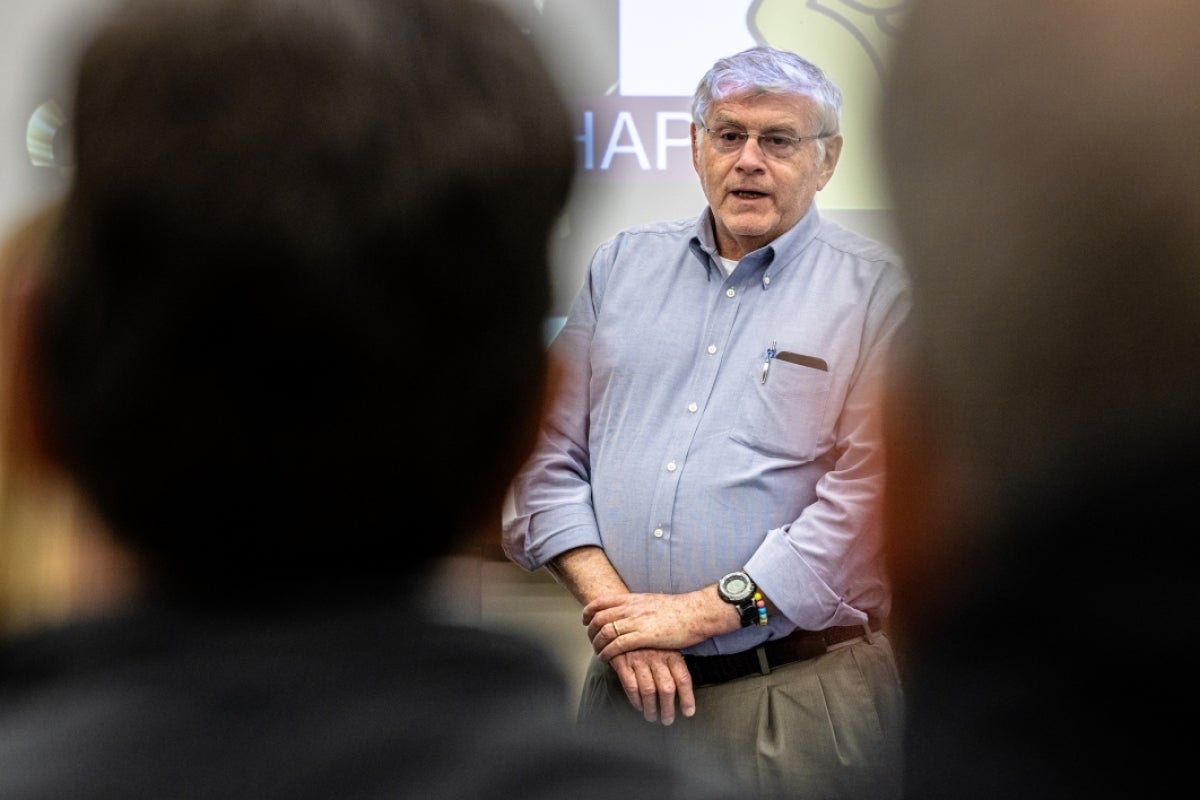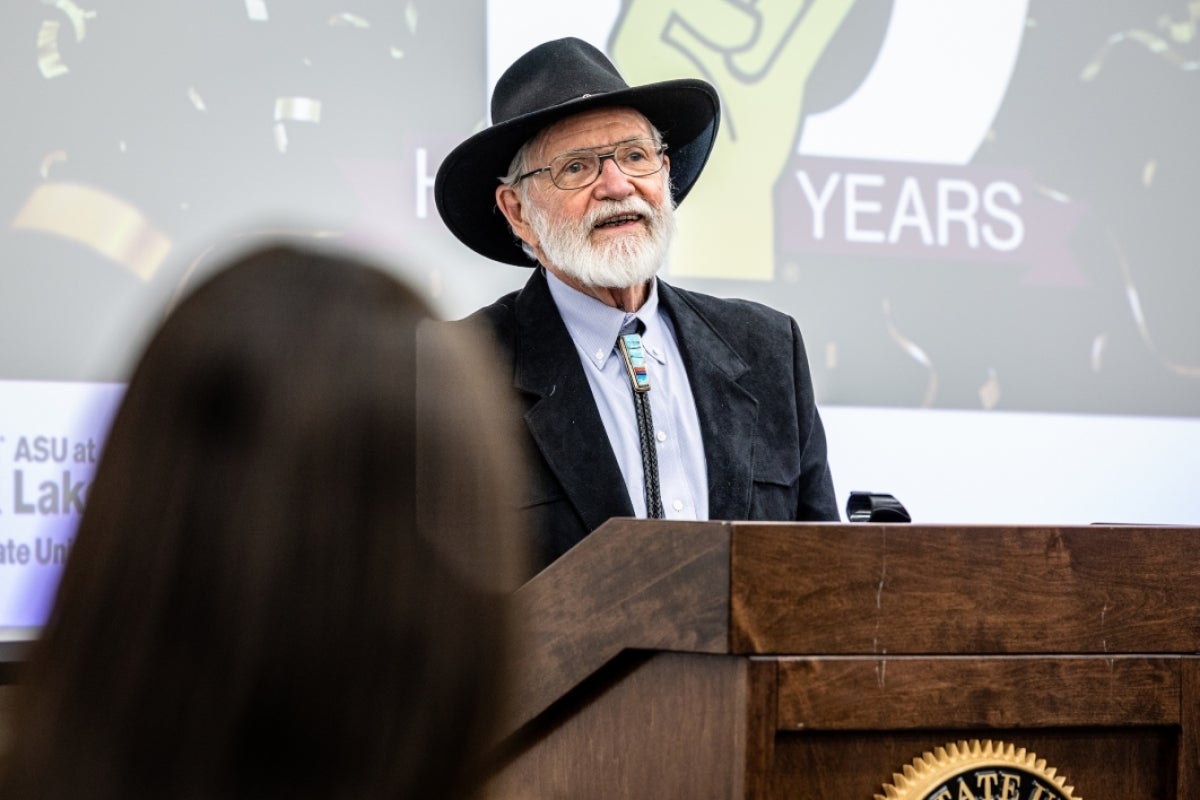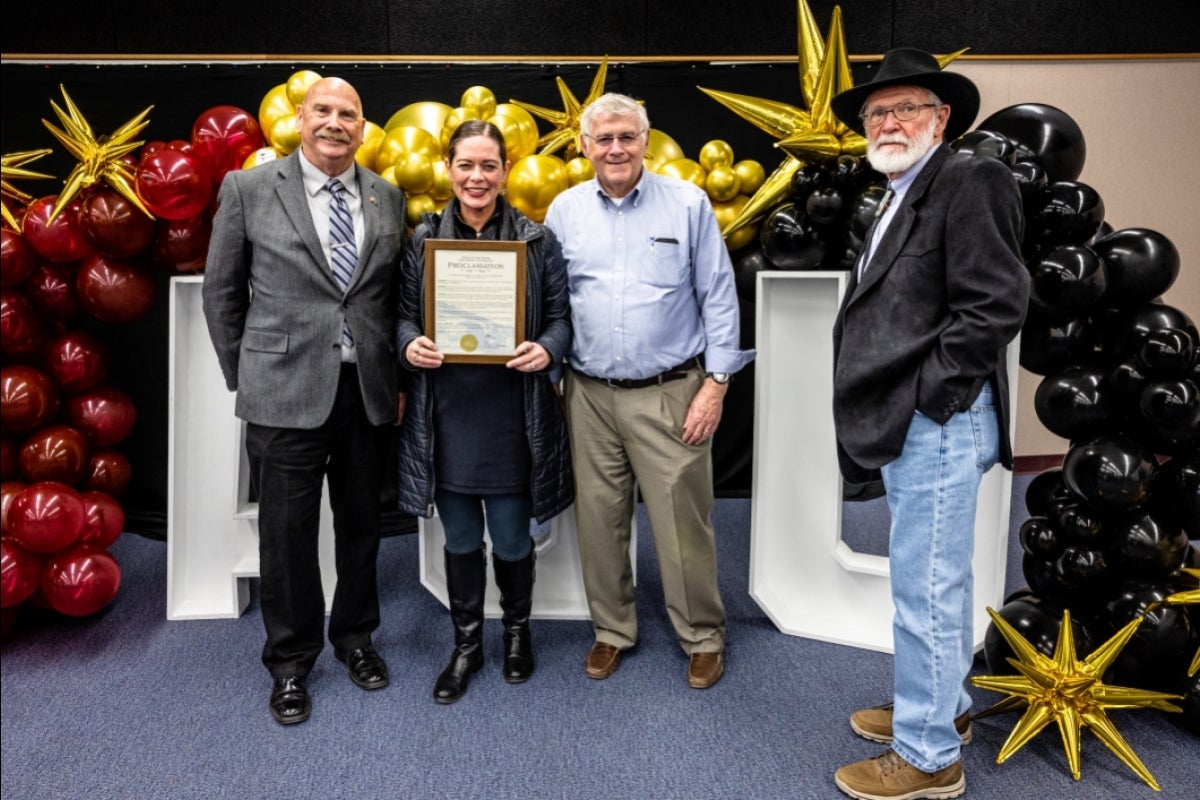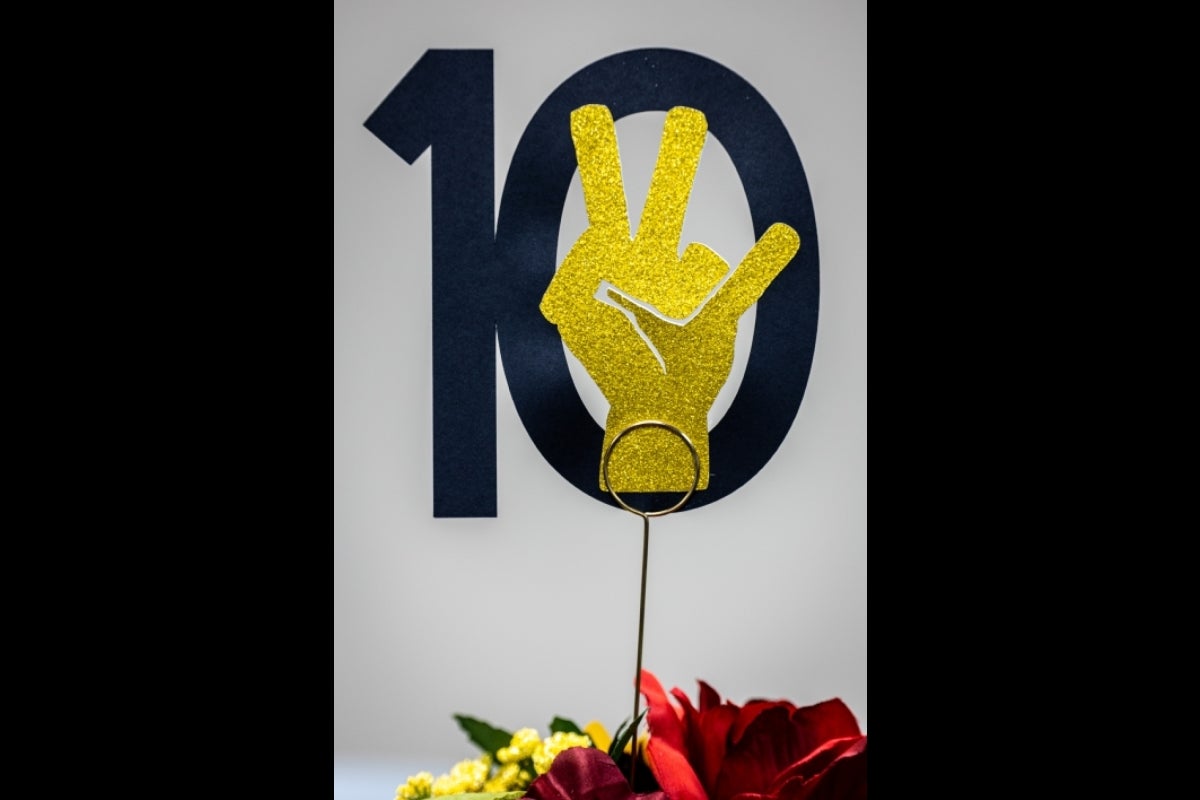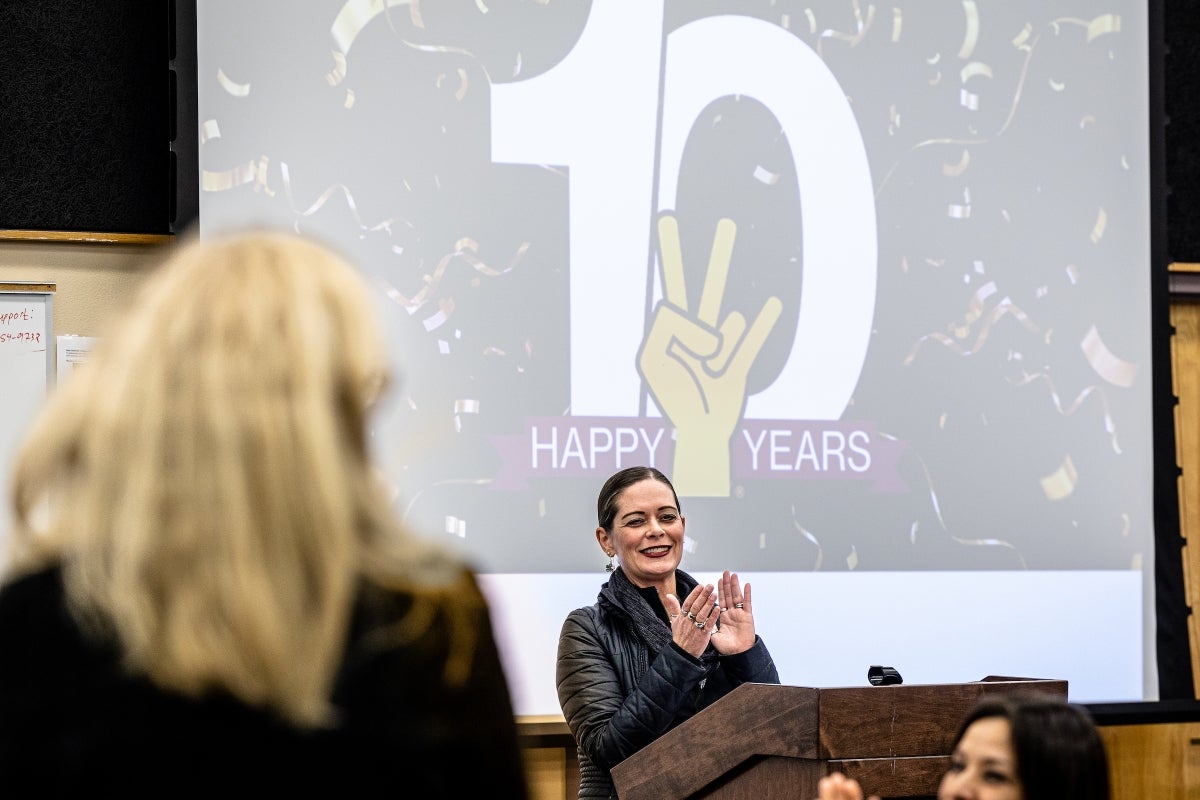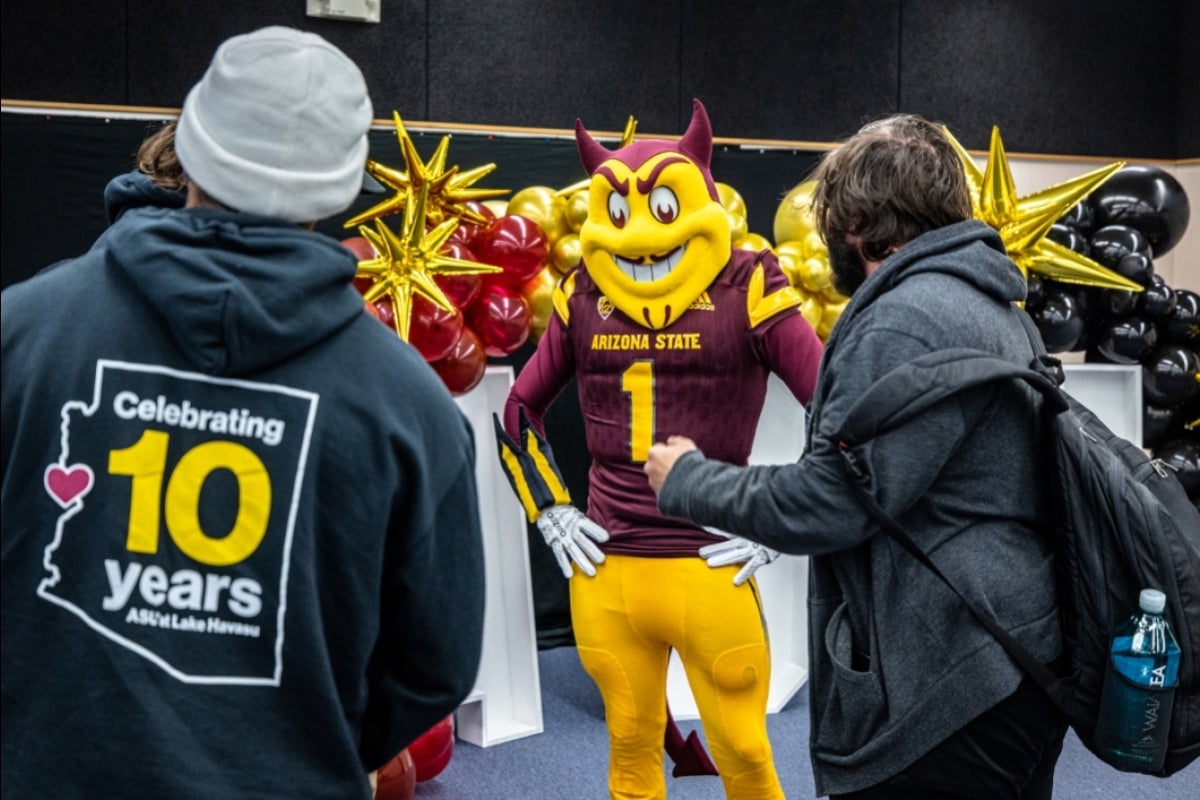ASU at Lake Havasu celebrates 10 years of community education

ASU at Lake Havasu Director Carla Harcleroad (center) and Sparky are joined by faculty, staff and community leaders for a ribbon cutting in front of a new sign at Acoma Boulevard and Swanson Avenue to kick off the 10-year anniversary celebration of ASU at Lake Havasu on Wednesday, Feb. 22. Photo by Charlie Leight/ASU News
Editor’s note: This story is featured in the 2023 year in review.
Shortly after the onset of the Great Recession, a Lake Havasu middle school sat vacant, and the city needed revitalization.
Its citizens saw opportunity in higher education — specifically the innovation that Arizona State University could bring to the region.
They raised $2 million dollars through bake and T-shirt sales, payroll deduction campaigns and other fundraising activities. A generous donor matched their efforts, and a new college location was born.
That was a decade ago and is ASU at Lake Havasu’s proud origin story.
“It’s hard to believe this ASU location is 10 years old because we still think of ourselves as young, vibrant and evolving,” said Carla Harcleroad, who has served as the executive director for ASU at Lake Havasu since 2020. “We keep growing and innovating in the right direction. I can’t wait to see what happens in the next decade.”
City council members, business officials, local dignitaries, and ASU faculty and staff marked the occasion in February with a ribbon-cutting ceremony, reception and open house featuring several guest speakers tied to the campus’ history. Sparky was there, too.
Video by Ken Fagan/ASU News
“President Michael Crow saw this as a place to try and experiment. We tried lots of different things to make this place different and stand out from the rest of ASU,” said David Young, who was ASU at Lake Havasu’s first director and served from 2012–17. “From the very beginning, we emphasized to students to become engaged and volunteer whenever they could because this was truly a community effort. This place would not have happened without the community getting behind this project.”
Rich Stanley, ASU senior vice president and university planner, said the success of the campus is due to the unwavering support of the community, businesses, committees, school boards, non-profit organizations and citizens banding together.
“ASU said to the world, ‘We’re interested in finding places outside our metropolitan areas,’ and Lake Havasu was one of the places that raised their hand and said, ‘We’d like to talk to you about it,’” Stanley said. “We gradually found too many things that were hard to do but everybody kept talking and kept saying, ‘We can find a solution.’ They were the ones who kept this thing going, and so here we are.”
Lake Havasu City Councilwoman Jeni Coke was involved since the beginning. She said the Great Recession hit the city hard. People moved away, city coffers were dwindling, and businesses suffered and shuttered. And the citizens knew that an ASU location could turn things around.
“Arizona State University wanted a rural campus. We wanted to be the rural campus,” said Coke, who has been a Lake Havasu City resident for 23 years. “We had a perfect location by downtown. It was everything they were looking for, and the shoe fit. This community raised $2 million and said, ‘We want this!’”
That fervor for the campus has never waned according to Lake Havasu City Vice Mayor David Lane.
“The city council does not make a decision without discussing how this will affect our relationship with ASU and how we can include ASU in those discussions,” said Lane, a former California Highway Patrolman, who sits on several other local boards and committees. “It’s fascinating what this campus has done for the community. We are teaching to different cultures from around the world and learning from them as well. I recently met a student who had never actually seen a pickup truck in person, only in books. So I tossed her the keys to my pickup truck and said, ‘Go for a drive.’ That’s an experience she got to take back home.”
The economic impact has also been substantial, according to Lisa Krueger, president and CEO of the Lake Havasu City Chamber of Commerce.
“The impact has been amazing. ASU has given us an opportunity to have the very best post-secondary educational experiences for our local residents,” Krueger said. “ASU also brings people from around the world to come and experience Lake Havasu City, study and learn here, and in some cases, make a home here once they’ve completed their studies.”
Second-year business student Haider Virk said he couldn’t think of a better college experience. He originally wanted to attend classes at the Tempe campus, but the more he read about ASU at Lake Havasu City, the more intrigued he became.
“ASU’s W. P. Carey School of Business is pretty famous. It’s on par with the Harvard Business School,” said Virk, who hails from Pakistan. “There are many things I like here: small class sizes, better interactions with the faculty, and tuition is cheaper. In terms of the student body, we’re all like a big family because we all know each other.”
The campus’ international reputation also extends to faculty. Leepsa Nabaghan Madhabika, an assistant teaching professor from India, wanted to teach in Lake Havasu City.
“This is a very community-oriented location, and we have a diverse group from a lot of different countries,” said Nabaghan Madhabika, who teaches business classes at the campus. “I have international experience and I want to be able to offer and share that with our students. ”
Since 2012, ASU at Lake Havasu has gone from a quaint campus to a location that offers high-demand degree programs, more than a dozen full-time faculty and a record-high enrollment in fall 2022.
That goal is now within reach with the recent announcement of ASU Local, an innovative hybrid college program that pairs in-person coaching and mentorship with those looking to earn a bachelor’s degree.
“ASU Local brings the best of a global research university to you. At learning environments across the country, we enable students to stay rooted in their communities while pursuing degrees,” said Maria Anguiano, executive vice president of Learning Enterprise. “Students engage in ASU Local’s signature experiences, where we nurture belonging, resilience and in-demand skills. Success coaches guide students and help them navigate every step of the college journey. A hybrid cohort model emphasizes peer-to-peer connections, empowering students to grow their network while developing the capacity to thrive in a competitive job market.”
Anguiano said that they’ve embedded this core design in the ASU California Center in downtown Los Angeles, the ASU Barbara Barrett and Sandra Day O’Connor Washington Center in Washington, D.C., and Arizona Western College in Yuma, Arizona.
The campus has reached a milestone and is turning a corner. But it’s also firmly sticking to its roots.
“ASU at Lake Havasu is looking ahead at the next decade and preparing for additional enrollment and engagement growth through innovative programs, partnerships and facilities enhancements,” Harcleroad said. “As the campus adapts and changes in the coming years, it will retain its focus on personalized teaching and learning opportunities and an intimate college experience. The future is bright, and we’re looking forward to our next steps.”
Related stories
Manipulating molecules and minting chemists
ASU makes nursing degree more accessible to students at Lake Havasu location
More Arts, humanities and education

Upcoming exhibition brings experimental art and more to the West Valley campus
Ask Tra Bouscaren how he got into art and his answer is simple.“Art saved my life when I was 19,” he says. “I was in a dark place and art showed me the way out.”Bouscaren is an …

ASU professor, alum named Yamaha '40 Under 40' outstanding music educators
A music career conference that connects college students with such industry leaders as Timbaland. A K–12 program that incorporates technology into music so that students are using digital tools to…

ASU's Poitier Film School to host master classes, screening series with visionary filmmakers
Rodrigo Reyes, the acclaimed Mexican American filmmaker and Guggenheim Fellow whose 2022 documentary “Sansón and Me” won the Best Film Award at Sheffield DocFest, has built his career with films that…


